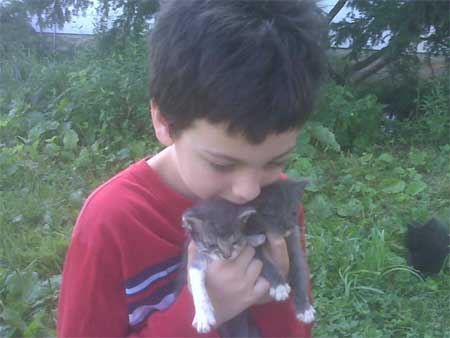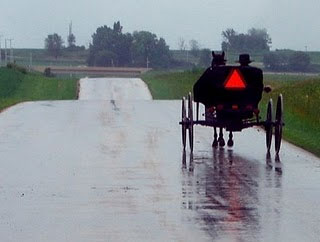What are we working for, really?
I told the farmer I wanted a horse.
Here are things I know about horses from the farmer's response:
1. Horses are very cheap right now. It used to be that you could buy an estate, put horses on it, call it a horse farm, and take a tax deduction on all the land. But the US just banned slaughtering horses. I am not sure why. I think this is part of Obama's attack on US subsidies to the rich. (Which, by the way, I support, and I am hoping he is so creative as this.) Anyway, now there are tons of people who want to get rid of horses.
2. Horses are a luxury to people who make a living from their farm. I will not get into the nuances of making a living vs. not making a living from a farm.
But wait. I think I will.
It's complicated. For example, if your great-great-grandfather homesteaded land and consequently you inherited 2000 acres and you mortgage it to support your family, is the farm supporting you? And if you don't mortgage it, but you live in poverty, is the farm supporting you? Stay tuned for posts when I answer these questions. Or just bitch about them. But anyway, horses are a luxury, according to the farmer, because they are a lot of work and they never make any money. (Well, except for the Amish, who still use horses to run farm equipment. But this will be in another post, too.)
No. I think it will be in this post. Everything in this post, but in a minute.
The issue is: what is making a living? And I actually do think I know the answer. The answer is if you are honestly making enough money to meet your needs.
So, for example, take Melville. He's hard for me to read because he was such a crappy provider for his wife and kids. I try to not think of that because my favorite character in all of literature is Ahab. And maybe it's impossible to write that crazy a character who we will still all identify with unless the author is crazy himself. Because we all would like to do just what we love and not support ourselves, but most of us don't indulge ourselves that way.
I used to say that all anyone needed to earn was $40,000 a year. And, because I dedicated the last decade (perhaps inadvertently) to personally testing all the happiness research I read I can attest that when I made $300,000 a year in LA my happiness was the same as when I made $40,000 in NYC. And, in that time, the Big Happiness Number has become $75,000, but I think that how much money I made didn't matter because my basic, underlying personal problems did not change.
Not that I am sure what they are, by the way. I am pretty certain, though, they are something about feeling lonely, because I don't read non-verbal cues well, and because I didn't feel loved as a kid. But, here's something else I learned from the happiness research: You will gain more from being my friend if I talk about happiness than if I talk about sadness.
So, lucky for you, I am clearing the $75,000 mark nicely this year, and the farmer responded to my request for a horse. With a donkey. He said that I have to take care of the donkey each day and if I do that, then we can consider the horse. But the farmer doesn't want to have a horse that he is taking care of.
The farmer thinks that taking care of animals that don't provide financial gain in return is a petting zoo, not a working farm. This is probably true. And, speaking of petting zoo, we have about 15 baby cats.

Here is a cat story: I think all farms have some cats. Is that right? Cat science: Tomcats travel from farm to farm, and girl cats stay on one farm. Some farms are very organized and they spay two cats and shoot the rest. Other farms, like the farmer's farm, let nature take its course. When the farmer lived alone, it was so hard for the babies to stay alive that it was a sort of Malthusian society where, by the end of the winter, he was always down to a manageable population of five or six.
But then the kids and I moved in, and we started taking kittens to the vet. And then we started buying expensive, grocery store food for the cats instead of forcing them to fight for table scraps.
The kittens started thriving, and things were going so well for the mom cats, that they were even getting pregnant twice in one summer. This was great news to me and the kids, because seeing one-day old cats is amazing—they fit in your hand. And taking care of them is great fun. But the farmer got worried.
Side story to the cat story but essential information: One of the farmer's friends, a dairy farmer, has a bunch of little girls, the demographic most likely to coddle kittens. After about three years of four girls, the friend's farm had 150 cats. So the friend and his wife took their kids away for the day and he had three friends come with beer and shotguns and they turned the farm into a cat-killing video game. The cats with the red ribbons on their necks were the ones the family wanted to keep.
So I guess we will have one summer of kitten glory and then I'll pay to spay the cats.
Which brings me to making a living on the farm. It's always a debate. Is it making a living if you don't have money to treat cats humanely? Because most farmers won't spend the money to spay cats. Is it making a living if the wife works off-farm? Because most farm families today need someone working off-farm, at least for the health insurance.
Sometimes, when I'm philosophizing about what making a living means, I think about lifestyle. Which brings me to the Amish. We live in a community where the Amish are buying a lot of land. They sell their land in Pennsylvania for $20,000 an acre and then move to our region of Wisconsin and buy land for $5000 an acre. So I'm living amongst the yuppie Amish.

photo credit: 42N
To the Amish, making a living is sustaining a family within a community, and there's a great new book that describes why this formula leads to success in business: Success Made Simple: An Inside Look at Why Amish Businesses Thrive, by Erik Wesner. For the Amish, the community is first. They do not drive cars because driving does not promote community, but they can hire someone to drive them, because sometimes you need to do that, and anyway, the alternative of making everyone into crazy Luddites does not develop community either.
The Amish are making me rethink why people work. And what supporting a family means. The Amish sense of community is incredible, and while we each think we are making a living by supporting the family unit, or supporting ourselves to create a world full of meaningful relationships, we are nothing like the Amish. We make so many choices based on our individual desires. For example, that I want a horse, or that the farmer wants to never leave the farm for a job that pays $75,000 a year.
I am thinking that the research about what makes us happy always comes down to community, not money. You become more like your friends, meeting regularly with a group makes us happier, if we structure our lives around consistent relationships—including proximity—we are happier. So maybe Wesner's book on business is the most useful research about happiness, because how to be happy is about how to make a living in a way that enables you to provide something for a group rather than just for yourself.

P:
Do not buy a horse. Learn to ride a horse, get lessons, even lease a horse. But do not buy one. They are cheap because the expenses are back-end-loaded, to speak investorese. Leasing is a good way to learn what you want in a horse, by paying its expenses, without being stuck on the 20-year plan with a nonliquid asset.
And I agree with the posters above: the no-slaughter laws are asinine. Get Temple Grandin to design a humane abbatoir for horses, by all means, but don’t pretend that life isn’t icky sometimes. The slow death by starvation and neglect is far worse.
Your posts have been getting steadily more incoherent over the past couple of months and I was starting to wonder why I was continuing to read this blog at all. Today’s post was not only incoherent (The perfect income! Dead kittens! I want a pony! Amish! Happiness! Here’s a picture of my kid!) but disgusting. Even if there was a good reason to post that thing about the dead cats (which I doubt), there was no good reason to do it with such callous offhandedness. To paraphrase a friend of mine with Asperger’s, if sociopaths can learn to be charming enough to lure murder victims to their homes, then an Asperger’s sufferer can learn to carry on a conversation that doesn’t drop a gross-out bomb in the middle of it. Yeah, it’ll raise the comment count, but it’s not going to make anyone want to be near you, even online.
You say Melville is hard for you to read “because he was such a crappy provider for his wife and kids.” Well, Brazen Careerist is becoming hard for me to read because the author doesn’t seem the least bit interested in defending her increasingly ridiculous positions about animals, manicures, New York, childrearing, or anything else really. I find it telling that you steadfastly ignore the trenchant critique that H. and subsequent commenters wrote about your excruciating horse-princess paragraph, but then you’re more than happy to write a tedious comment about profit margins on chickens two screens down. (This was an annoyance for me right when I first started reading the blog, years ago — you rarely engage your audience and you never, ever respond to criticism. This is made worse, not better, by the fact that you occasionally write comments congratulating the people who agree with you or answering totally insubstantial questions. So much for “community.”)
Yeah, it’s been an okay three years but I’m unsubscribing. Get your ad revenue somewhere else.
I know what you mean. It’s funny to see people working so hard all of their life, and when they retire they spend all their hard earned money on pills and doctors.
We don’t really need all this stress.
Oy-vay. Welcome to my world. You write about your barn cat proliferation and your desire to own a horse and suddenly you are evil. I too have a collection of hate mail after my barn cat posting. By the way – kijiji works well for finding good homes for unwanted kittens and yes, spaying the mothers is the best way to go. Good luck with the totally unhelpful comments from critics!
A slow death by starvation might be worse than a quick death, but being responsible in the first place would make that unnecessary. Why not just spay the females when there are less than 20 cats instead of waiting till it’s completely out of control?